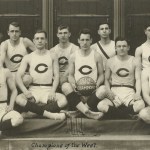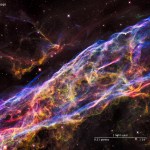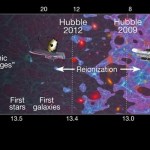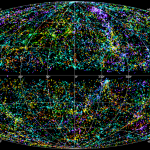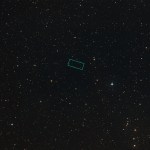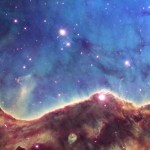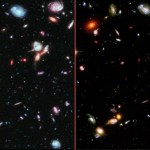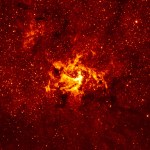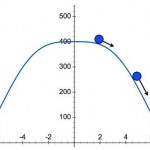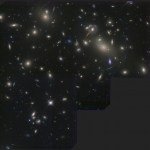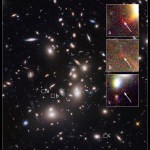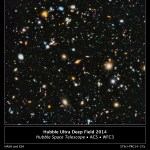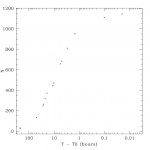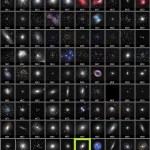Hubble
"Equipped with his five senses, man explores the universe around him and calls the adventure Science." -Edwin Hubble
Back in the 1920s, Einstein's general relativity had just come out and gained acceptance, and a debate was raging over whether the spirals in the sky were within our own galaxy, or were entire galaxies unto themselves.
Image credit: E. Hubble, NASA, ESA, R. Gendler, Z. Levay and the Hubble Heritage Team, via http://apod.nasa.gov/apod/ap110701.html.
Not only did Edwin Hubble put that debate to rest, discovering that they were galaxies, but he measured their distances and…
"Gravitational and electromagnetic interactions are long-range interactions, meaning they act on objects no matter how far they are separated from each other." -Francois Englert
Want a recipe for seeing as far into the distant Universe as you can? Because of how distance and brightness are inversely related, you need to make the most of every photon, build as large a telescope as possible and observe for long periods of time in order to collect the most light.
Image credit: XMM-Newton, ESA, NASA.
But there's an extra bit of magnification that Einstein's General Relativity gives to us for…
“No matter how ‘normal’ people look, living ‘ordinary’ lives, everyone has a story to tell. And may be, just like you, everyone else is a misfit too.” -Sanhita Baruah
Every century or so, possibly even more frequently, a supernova goes off somewhere in the Milky Way galaxy. While the explosion itself is only visible for a few months, the remnant sticks around for many thousands of years. Although it isn't always visible in the portion of the spectrum our eyes are sensitive to, X-rays, Ultraviolet light, infrared and radio observations bring them to life.
Image credit: NASA/JPL-Caltech,…
“Our posturings, our imagined self-importance, the delusion that we have some privileged position in the Universe, are challenged by this point of pale light. Our planet is a lonely speck in the great enveloping cosmic dark. In our obscurity, in all this vastness, there is no hint that help will come from elsewhere to save us from ourselves.” -Carl Sagan
And yet, we're not alone, in that the Universe has hundreds of billions of galaxies, each with hundreds of billions of stars in it, to keep us company. Thanks to the power of the world's most advanced telescopes like Hubble, we've been able…
When it comes to the Universe, physicists say things like: it originated in a Big Bang, it's isotropic (or the same in all directions), and it's homogeneous (the same everywhere), save for the effects of cosmic evolution. In every direction we look, we see galaxies expanding away from us, with the expansion rate increasing the farther away we look.
Image credit: NASA / WMAP science team, via http://map.gsfc.nasa.gov/universe/bb_tests_exp.html.
But an expansion inherent to the fabric of space itself isn't the only explanation; it's conceivable that we see what we see because everything…
“Deep into that darkness peering, long I stood there, wondering, fearing, doubting, dreaming dreams no mortal ever dared to dream before.” -Edgar Allan Poe
Thanks to the Hubble Space Telescope, we've learned for a certainty that the black abyss of empty space isn't really so empty. Far beyond what we can perceive with our naked eye (or even ground-based telescopes), galaxies exist and go on for tens of billions of light years.
Image credit: Digitized Sky Survey (DSS), STScI/AURA, Palomar/Caltech, and UKSTU/AAO, via http://hubblesite.org/newscenter/archive/releases/2010/01/image/h/.
So what…
“People get cranky when you burst their bubble. Over time, advances in astronomy have relentlessly reinforced the utter insignificance of Earth on a celestial scale.” -Nathan Myhrvold
When new stars form from a collapsing molecular cloud, the hottest, bluest, brightest stars emit high-energy ultraviolet radiation. This evaporates, ionizes and pushes the gas outwards, creating a bubble effect.
Image credit: Copyright 2006 Brad Moore and Southern Astro, via http://hubblesite.org/newscenter/archive/releases/2008/34/image/e/.
Thanks to the Hubble Space Telescope and its ability to hone in…
“No distance of place or lapse of time can lessen the friendship of those who are thoroughly persuaded of each other’s worth.” -Robert Southey
You might think that, when it comes to finding the most distant objects in the Universe, all we need is a good telescope, to leave the shutter open, and wait. As we accumulate more and more photons, we're bound to find the most distant, faint objects out there.
Image credit: NASA, ESA, R. Bouwens and G. Illingworth (UC, Santa Cruz).
It's a nice thought, but it misses an important fact: the Universe is expanding! And with that expansion, the…
“It is by going down into the abyss that we recover the treasures of life. Where you stumble, there lies your treasure.” –Joseph Campbell
Imagine you just stared into darkness, collecting every photon of light that came by. What would you wind up seeing? The Hubble Space Telescope has done this many times, creating the Hubble Deep Field first and then the Hubble Ultra Deep Field with upgraded cameras and more time. But most recently, the eXtreme Deep Field has surpassed even that.
Image credit: NASA, ESA, G. Illingworth, D. Magee, and P. Oesch (University of California, Santa Cruz), R.…
“But I see it differently now. There has to be a middle. Without it, nothing can truly be whole. Because it is not just the space between, but also what holds everything together.” -Sarah Dessen
Sure, the Hubble Space Telescope gives us unparalleled views of our Universe. We can even use it -- with its near-infrared camera, NICMOS -- to view the very center of our galaxy, something completely blocked by dust in visible light.
Image credit: NASA, ESA, and Q.D. Wang (University of Massachusetts, Amherst), via http://hubblesite.org/newscenter/archive/releases/2009/02/image/b/.
But part of the…
“The voyage of discovery is not in seeking new landscapes but in having new eyes.” -Marcel Proust
As another fine week comes to a close at Starts With A Bang, let's take a look back at all the topics we've taken on:
Where did light first come from? (for Ask Ethan),
Zooming into a fractal (for our Weekend Diversion),
Space turns green on 4/20 (for Mostly Mute Monday),
The illusion of reality (a great contribution from Brian Koberlein),
Everybody wants to rule the quantum world (a special extra from Paul Halpern),
Earth day in the Universe,
What is the strong…
“Silently, one by one, in the infinite meadows of heaven,
Blossomed the lovely stars, the forget-me-nots of the angels.” -Longfellow
The cosmic microwave background is a thing of beauty, as not only does its uniform, cold temperature reveal a hot, dense past that began with the hot Big Bang, but its fluctuations reveal a pattern of overdensities and underdensities in the very early stages of the Universe.
Image credit: NASA / WMAP science team, via http://map.gsfc.nasa.gov/mission/sgoals_parameters_spect.html.
It's fluctuations just like these that give rise to the stars, galaxies, groups…
When you think of the Hubble Space Telescope, perhaps you think of what's touted as its most major feat of all: peering off into deep, dark space, collecting light, and discovering the plethora of distant galaxies laying billions of light years beyond our own.
The Hubble Space Telescope’s Ultra Deep Field. Prior to the Fronier Fields program, this was the deepest look into the Universe available to human kind. Credit: NASA, ESA, H. Teplitz, M. Rafelski (IPAC/Caltech), A. Koekemoer (STScI), R. Windhorst (Arizona State University), and Z. Levay (STScI).
It's a spectacular sight and a…
“That I learned even as a three year-old that I see this world that is really a mess and I learned to say, ‘This is not me. I am not the one that is messed up. It is out there.’” -Story Musgrave
It was 25 years ago this year that the Hubble Space Telescope first opened its eyes on the Universe. It wasn't as you might've expected, all that impressive. For one, there were flaws in the optics of the primary mirror, and for another, the camera we installed on it was, I hate to say it, pretty lame.
Image credit: NASA, of the first Hubble servicing mission.
But in 1993, a servicing mission…
“The probability of success is difficult to estimate; but if we never search the chance of success is zero.” -Giuseppe Cocconi and Philip Morrison
Although, for many various reasons, most of us may find the prospect of journeying into deep space beyond our physical grasp, that doesn't means we can't journey there in our imaginations. Have a listen to Catie Curtis sing her fanciful, escapist song,
Wallpaper Dreams,
while you consider some of the greatest images ever taken of deep space.
Image credit: X-ray: NASA/CXC/Univ.Potsdam/L.Oskinova et al; Optical: NASA/STScI; Infrared: NASA/JPL-…
Smile, and the whole Universe smiles with you! - A Happy Asterism for #AAS224
A beautiful UV co-added image of the UDF from Hubble
UV UDF
But, if you look closely...
Smile - it could be worse
In times past we have lovingly tracked the proposal frenzy as the near annual Hubble Space Telescope proposal deadline approaches.
As was noted by Julianne several years ago, and confirmed over the last half dozen cycles, the shape of the curve of number of submitted proposals as a function of time until the deadline is nearly invariant.
Interestingly, the total number of proposals also does not change much, some dips and spikes with the loss and availability of instruments, but the total is near stationary and some measure of the statistical saturation of the ability of astronomers to put…
"Tomorrow is the most important thing in life. Comes into us at midnight very clean. It's perfect when it arrives and it puts itself in our hands. It hopes we've learned something from yesterday." -John Wayne
There's a lot to look forward to on the precipice of the new year, and many of us will be up until midnight to ring it in. Well, if you're up that late, why not step outside and take a look at one of the deep-sky wonders of the Universe that won't be visible in the early part of the night for months! This Messier Monday, a near-moonless sky will greet you until the pre-dawn twilight, and…
"We especially need imagination in science. It is not all mathematics, nor all logic, but it is somewhat beauty and poetry." -Maria Montessori
The Universe has some wonderful sights to show you if you know how to look for them, and that's maybe most apparent when you look at some of the amazing images from the Hubble Space Telescope. Here on Earth, however, the onset of winter for many of us brings a little bit of scarcity with it, something Drive By Truckers can help you relate to with their song,
When The Well Runs Dry.
You might not think these two things are related -- the wonders of…
"To be is to be the value of a variable." -Willard Van Orman Quine
It's the end of the week once again, and the very end of our Year In Space 2014 Wall Calendar giveaway! So for this week's Ask Ethan column, after dipping into our question/suggestion box, I'm very pleased to let Vera from Italy know that her question was the winning one, as she asked:
I saw the video you posted about the variable star RS Puppis, by the Hubble Space Telescope, and I really would like a post about what exactly are variable stars.
Thank you very much Ethan!! :-)
So -- no burying the lede here -- there was…
